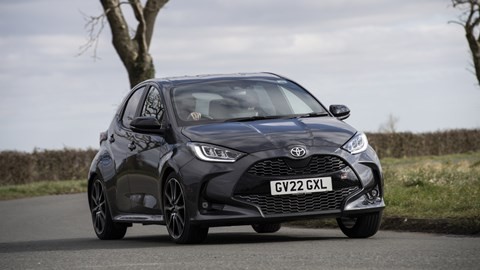► Discover the best small hybrid cars on the market
► Perfect for city driving and beyond with low emissions
► Featuring superminis, hatchbacks, and compact SUVs
Hybrid cars are increasingly popular as a practical middle ground between traditional petrol or diesel vehicles and fully electric cars. Unlike full EVs that sometimes require significant lifestyle adjustments, especially for those without home charging, the best hybrid cars seamlessly integrate into daily driving, offering a familiar experience with enhanced fuel efficiency.
However, the intersection of hybrid technology and small car design has been somewhat limited. Automakers have often prioritized hybrid powertrains for larger, more profitable models like hybrid SUVs. This trend, coupled with the general market shift away from smaller cars, means fewer options for buyers specifically seeking a hybrid small car.
Top Hybrid Small Cars at a Glance
- Most Affordable: Honda Jazz
- Most Spacious: Ford Puma
- Most Engaging Drive: Suzuki Swift Sport
This guide highlights some of the best Hybrid Small Cars currently available. The selection includes a range of hybrid types: self-charging hybrids, plug-in hybrids, and mild hybrids. While outright driving thrills might be scarce in this segment, these cars prioritize practicality and efficiency, offering a blend of enjoyable driving dynamics and eco-conscious performance.
Top Small Hybrid Cars in 2025: Reviews
Toyota Yaris
Best for Fuel Economy
Pros: Exceptional fuel efficiency, renowned Toyota reliability, robust build quality
Cons: Limited rear passenger space, interior design may feel basic
The Toyota Yaris Hybrid, while sometimes stereotyped, is a genuinely impressive supermini in its latest iteration. This stylish car features a 1.5-liter three-cylinder petrol engine that offers a significant improvement in refinement over its predecessor, particularly at higher speeds, making motorway driving much more pleasant.
Achieving over 60mpg in real-world driving conditions is remarkably easy with the Yaris, making it incredibly economical to run. The interior is solidly constructed and includes all essential features, though the overall ambiance might be perceived as somewhat understated.
Read our comprehensive Toyota Yaris review
Honda Jazz
Best for Small-Scale Practicality
Pros: Highly efficient hybrid system and intelligent packaging, excellent passenger space
Cons: Modest boot space, driving experience lacks excitement
The Honda Jazz stands out with its innovative hybrid system that primarily utilizes electric motors for low-speed driving, seamlessly engaging the petrol engine for efficient cruising at higher speeds. This setup results in a smooth driving experience, easily achieving 50mpg, perfectly complementing the Jazz’s character.
The Jazz also offers exceptional value, being the most affordable full hybrid car currently on the market. Despite its compact size, it provides more passenger space than many larger vehicles. The versatile seats offer ample room for four adults, though the boot space is somewhat limited with the seats up.
Read our detailed Honda Jazz review
Renault Clio
Best for Upscale Interior
Pros: Excellent fuel efficiency, premium interior design and materials
Cons: Restrictive rear seat space, hybrid system can feel slightly unrefined at low speeds
Renault has incorporated its Formula 1 expertise into the Clio’s hybrid powertrain, employing a sophisticated combination of dog clutches and electric motors. The result is fuel economy comparable to its supermini rivals, although the system can feel a touch less polished, exhibiting slight clunkiness at lower speeds. However, it delivers strong performance for a car of its size.
The Clio’s interior is remarkably refined for a small car, particularly in higher trim levels with a portrait-style infotainment screen that is both high-resolution and user-friendly. The boot is generous, though this comes at the expense of rear passenger legroom. A refreshed Clio model is anticipated, bringing further enhancements to its aesthetics and technology.
Read our in-depth Renault Clio review
Suzuki Ignis
Best for Light Off-Road Adventures
Pros: Genuinely compact dimensions, surprisingly agile and fun handling
Cons: Interior materials feel budget-oriented
The Suzuki Ignis is an intriguing option, blending city car dimensions with SUV styling. It even offers Suzuki’s AllGrip 4×4 system, making it surprisingly capable in light off-road conditions, surpassing many larger crossovers in terms of ruggedness.
The Ignis’s mild hybrid 1.2-liter engine prioritizes efficiency over outright power, but it achieves over 60mpg when driven gently. The tall body design also translates to a surprisingly spacious interior.
Peugeot 308
Best for French Flair
Pros: Striking design, sophisticated interior, comfortable ride quality
Cons: Unconventional small steering wheel may not suit all drivers
The Peugeot 308 represents the more upscale option within Stellantis’s mid-size hatchback range. Positioned above the Vauxhall Astra and Citroen C4 but below the DS 4, the 308 boasts a particularly premium interior. It features high-quality materials and advanced displays, including customizable ‘i-Toggles’ – a functional and cleverly executed feature despite the quirky name.
The Peugeot’s driving position can be challenging for some due to the small steering wheel, and its plug-in hybrid system isn’t class-leading in terms of efficiency or refinement. However, it offers adequate smoothness and ample performance.
Read our detailed Peugeot 308 review
Toyota Yaris Cross
Best for Efficiency in a Compact SUV Format
Pros: Excellent fuel economy, generous boot capacity
Cons: Uninspiring exterior styling, somewhat drab interior
The Yaris Cross is essentially a Yaris amplified into a compact SUV. It retains the standard Yaris’s 1.5-liter hybrid powertrain and maintains impressive fuel efficiency, easily exceeding 50mpg with careful driving.
It offers excellent interior space for its class, with comfortable rear seats and a deep boot. While the Yaris Cross may lack visual excitement, its practicality and sensible nature are strong selling points.
Read our comprehensive Toyota Yaris Cross review
Suzuki Swift Sport
Best for Hybrid Hot Hatch Enthusiasts
Pros: Lightweight and engaging handling, fun driving dynamics
Cons: Interior feels basic, performance is not truly hot hatch level
The Suzuki Swift Sport is the most engaging car on this list for drivers seeking some driving enjoyment. While not a true hot hatchback in terms of power (producing 128bhp), it delivers a fun driving experience rarely found in small hybrids.
The Swift’s mild-hybrid system keeps the car remarkably light, contributing to its agile handling and enjoyable cornering. It also remains efficient and offers decent space for its compact size.
Read our detailed Suzuki Swift Sport review
Kia Niro
Best for Powertrain Choice
Pros: Available in self-charging and plug-in hybrid versions, well-made and spacious interior
Cons: Driving experience is not particularly engaging, size is at the larger end of the ‘small’ category
The Kia Niro pushes the boundaries of the ‘small’ car definition but remains relatively compact within the hybrid SUV segment. It offers the unique advantage of being available with both self-charging and plug-in hybrid powertrains, catering to different driver needs and preferences.
While not designed for thrilling driving dynamics, the Niro excels with a well-crafted and spacious interior, complemented by a remarkably intuitive infotainment system.
Read our comprehensive Kia Niro review
Ford Puma
Best for Boot Space
Pros: Engaging driving dynamics, powerful and responsive mild hybrid engines, exceptionally large boot with innovative Megabox
Cons: Interior dashboard materials feel low-quality
The Ford Puma stands out for its enjoyable driving experience. Its mild hybrid engines are both powerful and responsive, and its handling is impressively sharp, reminiscent of the acclaimed Fiesta supermini. The ride quality is also well-tuned.
Practicality is another strong point, with good rear passenger space and a class-leading boot, featuring the innovative MEGABOX underfloor storage compartment. The main drawback is the somewhat basic feel of the interior dashboard.
Read our detailed Ford Puma review
Toyota Corolla
Best for Longevity and Reliability
Pros: Comprehensive ten-year warranty, surprisingly enjoyable to drive, recently updated powertrain
Cons: Rear seats feel cramped, interior ambiance is dark and monotone
Toyota’s expertise in hybrid technology is evident in the Corolla, one of their standout models. Recently updated with a more powerful engine, the Corolla now offers improved drivability, being smooth, powerful, and highly efficient – almost matching the Honda Civic in driving enjoyment.
The updated infotainment system enhances the interior, although the rear seats remain somewhat cramped, and the overall interior design is quite dark and monochromatic.
Read our comprehensive Toyota Corolla review
Understanding Hybrid Technology
The term “hybrid” has evolved significantly, now encompassing various technologies aimed at extending range and reducing emissions. Early series hybrids, like the original Prius, minimized emissions by using the engine primarily as a generator at optimal efficiency, with limited electric-only driving.
Mild hybrid cars achieve similar benefits with smaller, lighter batteries that assist during less efficient driving phases but cannot power the car solely on electricity. Look for 48V or MHEV designations to identify these systems.
Plug-in hybrid systems utilize larger batteries for more significant electric driving range, enabling shorter journeys with zero local emissions. They often function as series hybrids as well, improving efficiency and recharging the battery using recovered energy.
However, the larger batteries in plug-in hybrids add weight and can reduce interior space, making them less ideal for the smallest cars. They can also be less economical than diesel engines for high-mileage driving.
View Leasing Offers
Are Hybrid Small Cars a Smart Choice in 2025?
For many drivers, a hybrid small car is an excellent choice, particularly a plug-in hybrid if charging is accessible. Current trends like reduced commuting, flexible work arrangements, and a growing emphasis on air quality, combined with the desire to avoid fuel stations, all favor hybrid vehicles. They offer a practical solution for varied driving needs, mitigating the range anxiety associated with pure electric cars.
Furthermore, hybrid cars can offer enhanced reliability and longevity, as their combustion engines are used less frequently, and regenerative braking in urban driving reduces wear on brake components. While no technology is without compromises, small hybrid cars effectively blend the benefits of zero-emission urban driving with the freedom for longer journeys, making them a compelling option for many.


